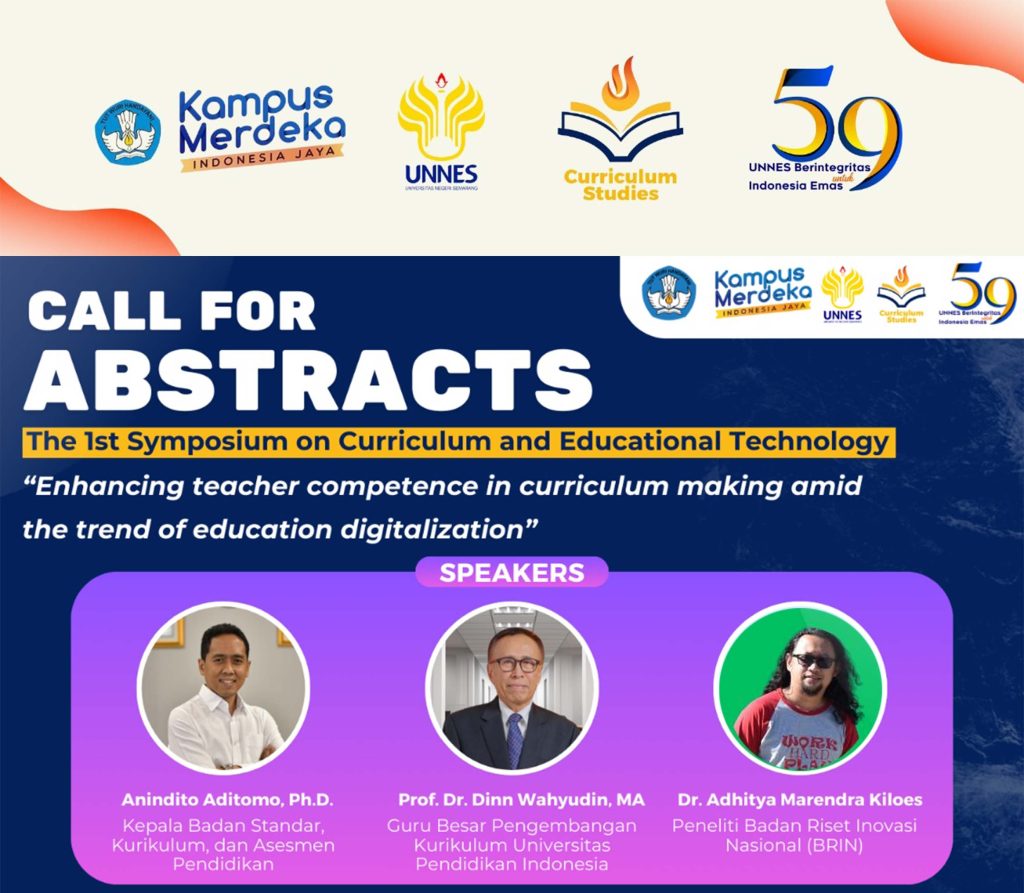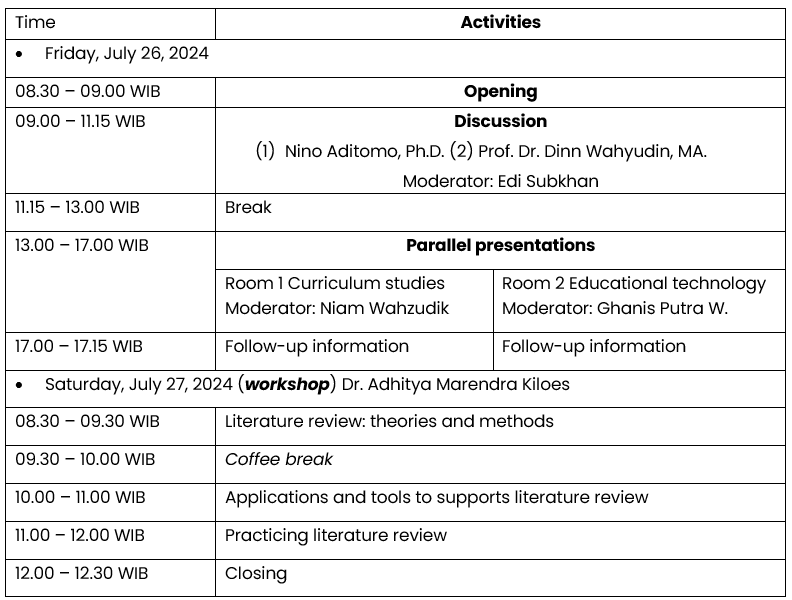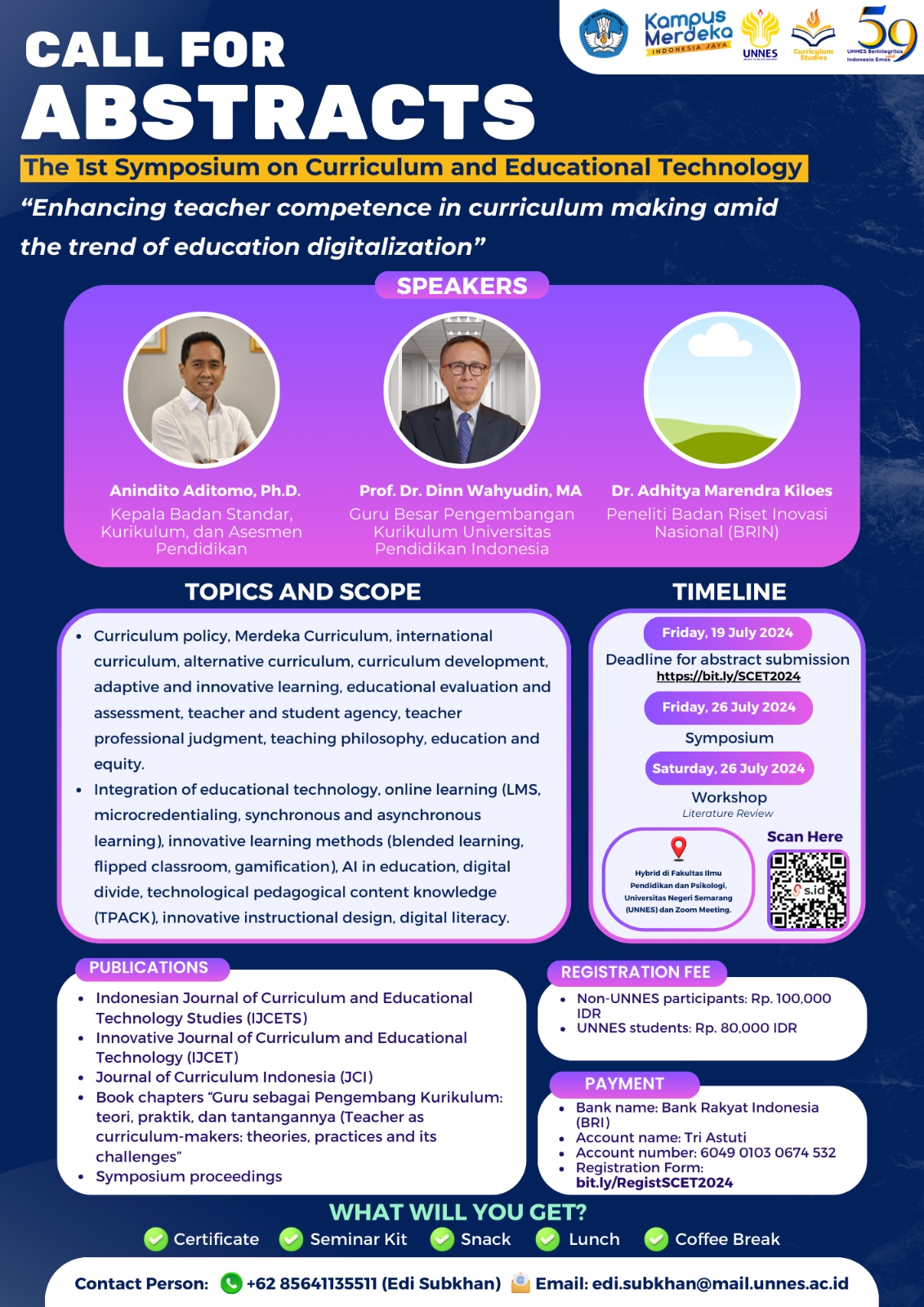
The 1st Symposium on Curriculum and Educational Technology
“Enhancing teacher competence in curriculum making amid the trend of education digitalization”
The Merdeka Curriculum, inaugurated by the Indonesian Ministry of Education, Nadiem Makarim, as part of the 15th period of the Merdeka Belajar initiative, reemphasizes the role of teachers as curriculum makers. While previous national curricula also required teachers to understand and contextually interpret the curriculum, the Merdeka Curriculum policy appears to offer greater autonomy for teachers. The challenge of teachers as curriculum makers is not an easy one, given that the Merdeka Curriculum introduces several new elements compared to its predecessors. These include a focus on essential materials, diagnostic assessments, differentiated learning, learning phases, and a more integrated formulation of learning outcomes (Wahyudin et al., 2024).
The crucial role of teachers as curriculum makers is essentially a global trend. For instance, the study by Leeman et al. (2020) highlights the importance of teachers as curriculum makers in the Netherlands. This is also evident in diverse contexts as examined by Kontovourki et al. (2018), Finnanger & Prøitz (2024), Marangio & Heyting (2023), and Alvunger (2021). Therefore, it is important to examine the competencies of teachers as curriculum makers (Tran & O’Connor, 2023), the knowledge that teachers need to master as curriculum makers (de Almeida & Viana, 2022), and what can be prepared in teacher training programs (Poulton & Golledge, 2024). Further studies related to the ideal characteristics of teachers as curriculum makers are also rapidly evolving. For example, Priestley et al. (2012, 2013) propose the theory of teacher agency as an ideal driving force, along with the concept of professional judgment in teachers (e.g., Qoyyimah et al., 2020).
Moreover, teachers face additional challenges with the inevitable integration of digital technology into education. In this context, strengthening teachers’ mastery of the Merdeka Curriculum relies heavily on the Merdeka Mengajar Platform (PMM). Likewise, education is increasingly supported by educational technology products, such as Learning Management Systems (LMS), as well as blended and hybrid learning models. Other cases show that, teachers often ask students to seek supporting information on the internet, indicating that teachers must also master educational technology. This context gave rise to the concept of technological pedagogical content knowledge by Koehler & Mishra (2005), a modification of Shulman’s (1986) pedagogical content knowledge. This teacher competency framework interweaves with other competency frameworks, such as those from Darling-Hammond (2010) and the Indonesian government.
Therefore, this symposium serves as a platform for sharing experiences and studies on the curriculum, particularly the Merdeka Curriculum, and the role of teachers as curriculum makers and implementers amid the digitalization of education and learning. The symposium aims to contribute to recommending appropriate strategies and policies to support this crucial role of teachers.
Topics and scope
- Curriculum policy, Merdeka Curriculum, international curriculum, alternative curriculum, curriculum development, adaptive and innovative learning, educational evaluation and assessment, teacher and student agency, teacher professional judgment, teaching philosophy, education and equity
- Integration of educational technology, online learning (LMS, micro credential, synchronous and asynchronous learning), innovative learning methods (blended learning, flipped classroom, gamification), AI in education, digital divide, technological pedagogical content knowledge (TPACK), innovative instructional design, digital literacy
- Anindito Aditomo, Ph.D. (Kemdikbudristek)
- Dr. Dinn Wahyudin, MA (UPI)
- Adhitya Marendra Kiloes (BRIN)—workshop on literature review
- Fakultas Ilmu Pendidikan dan Psikologi, Universitas Negeri Semarang (UNNES) (offline)
- Zoom meeting (online)
- Deadline for abstract submission: Friday, July 19, 2024
- Symposium dates: July 26, 2024
- Workshop date: July 27, 2024
- Click here to submit your abstract
- Indonesian Journal of Curriculum and Educational Technology Studies (IJCETS)
- Innovative Journal of Curriculum and Educational Technology (IJCET)
- Journal of Curriculum Indonesia (JCI)
- Book chapters “Guru sebagai Pengembang Kurikulum: teori, praktik, dan tantangannya (Teacher as curriculum-makers: theories, practices and its challenges”
- Symposium proceedings
- Non-UNNES participants: Rp. 100,000 IDR
- UNNES students: Rp. 80,000 IDR*
- Facilities: certificate, seminar kit, snacks, lunch, coffee break
- Click here to register your participation
- Bank name: Bank Rakyat Indonesia (BRI)
- Account name: Tri Astuti
- Account number: 6049 0103 0674 532


Contact
Edi Subkhan +62 85641135511
Email: [email protected]
* Undergraduate students from UNNES will receive subsidies/discounts for this event